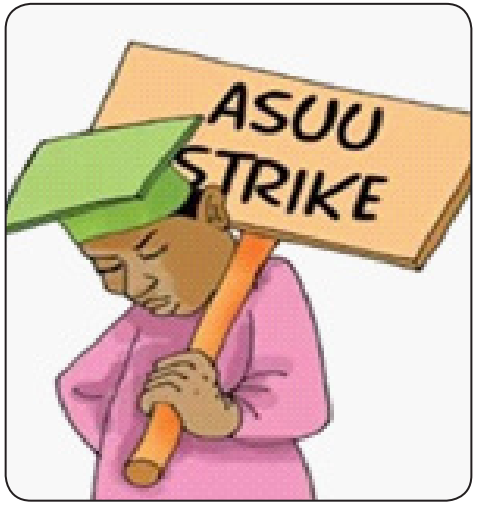
BY ROSEMARY NWAEBUNI
‘It is regrettable to note that nothing significant has happened since our last briefing on the eight issues in dispute. The two-week warning strike is based on some unresolved issues, which include the conclusion and signing of the renegotiated 2009 Federal Government-ASUU Agreement; payment of withheld three and a half months’ salaries; settlement of 25 to 35 percent salary arrears; release of promotion arrears covering over four years; the disbursement of withheld third party deductions such as cooperative contributions and union dues; and an end to victimisation of lecturers in LASU, KSU (now Prince Abubakar Audu University).
‘’If after the two-week warning strike, the government failed to meet our demands, what would follow would be a total and comprehensive strike’’, declared ASUU President, Prof Chris Piwuna, in utter exasperation.
‘’At the end of every strike, Nigerian students are the ultimate losers. The rent for accommodation is non-refundable, age count is irreversible, time lost cannot be regained, and course durations are inadvertently extended.
‘’The extension of stay at campus not only affects students’ academic journey, but it also destabilises their life plans, as many would miss NYSC mobilisation due to the age limit. Meanwhile, the lecturers and government officials in charge of education supervision are paid their salaries, complained Osaro, a distraught 300 Level Engineering student.
‘’Our children cannot afford to be at home. My two children just left for their institutions, and I have given them what they required. What happens if ASUU prolongs the strike? One of my children is in his final year, and the strike will certainly affect his graduation’’, complained Mrs Theresa Ojeme, a worried parent.
These extracted quotes underpin the widespread frustration faced by university lecturers, students and parents in a nation where education is not prioritised.
The ongoing two-week warning strike by ASUU, which followed the expiration of a 14-day ultimatum issued on September 28, may be a prelude to another lengthy stay-at-home by students in public universities across the country if the federal government remains adamant on its threat of a no-work-no-pay stance, instead of engaging the union for an amicable settlement.
According to the union’s National President, Prof Chris Piwuna, the action was necessitated by the federal government’s continued neglect of core issues that have lingered for over a decade.
The Academic Staff Union of Universities (ASUU) was established in 1978 to replace the Nigerian Association of University Teachers (NAUT), which was formed in 1965, covering academic staff in the University of Ibadan, University of Nigeria, Nsukka, Ahmadu Bello University, Zaria, University of Ife, Ile-Ife and University of Lagos.
This is not the first time ASUU has embarked on a nationwide strike. The first major strike by ASUU took place in 1988 during the military administration of General Ibrahim Babangida. The 1988 strike was embarked upon to demand improved working conditions for lecturers and increased funding for public universities. That national strike action led to the proscription of ASUU by the military government on August 7, 1988 and all its assets were confiscated.
The Union was allowed to resume in 1990 but was again banned on August 23, 1992, following a nationwide strike that was declared on May 14, 1992. After the government failed to engage ASUU in negotiations, the strike was called off on July 20, 1992.
On September 3, 1992, a deal was finally negotiated that addressed several of the union’s demands, including the right of employees to engage in collective bargaining. The ban was eventually lifted as part of that negotiation.
In 1994 and 1996, ASUU embarked on strikes to protest the military government of Sani Abacha’s firing of some academic staff. On December 17, 2013, ASUU declared a strike that lasted six months over the non-implementation of a 2009 agreement between it and the federal government. The strike was eventually called off after the federal government agreed to some of its demands.
Since Nigeria’s return to democratic governance in 1999, ASUU’s recurring disputes with successive federal governments have largely revolved around unmet agreements, irregular salary structures, poor infrastructure, and lack of autonomy and the overall decay of the university system. These disputes have triggered strikes that often grind academic activities across public universities to a halt for months.
Although ASSU has embarked on several strikes since its establishment in 1978, the most disruptive strike to date occurred in 2020, lasting a period of nine months, from March to December. The strike, which was initially triggered by the union’s rejection of the federal government’s Integrated Payroll and Personnel Information System, was compounded by the COVID-19 pandemic, which magnified the impact on students and institutions. Lecturers were suspended nationwide, graduations were postponed, and many students lost an entire academic year.
There are several reasons for the incessant strikes by ASUU. Chief among them is the government’s failure to implement agreements reached with the Union. The federal government has a penchant for not fully implementing or honouring past agreements with ASUU.
It is common knowledge among all and sundry that every time ASUU and the Federal Government get together to discuss their differences, it usually ends with the Federal Government promising the union that the demands would be met. It is the non-implementation of those promises over a long period of time that leads to ASUU going on strike with the aim of forcing the government to fulfil the agreements reached at previous negotiations.
Thus, the primary cause of ASUU’s strikes, virtually on an annual basis since 1999, has been the government’s failure to concede to the union’s demands.
These recurring strikes by the Academic Staff Union of Universities (ASUU) have profound impacts on students, parents and the quality of education in Nigeria.
ASUU strikes negatively impact students in many ways. For instance, courses meant to last four years extend to five or six due to disruptions of academic activities. Apart from students having to miss crucial learning time, they fall behind on coursework and experience a lack of continuity in their education, leading ultimately to poor academic performance.
The repeated disruption to the academic calendar may cause some employers to doubt the competence of graduates of public universities, thereby impacting their future job prospects. Many students may also feel discouraged and demotivated due to the irregular and prolonged nature of their studies.
Additionally, students may experience boredom, worry, anxiety and stress on account of prolonged strikes. Many students, due to idleness, may get involved in certain social vices like armed robbery, kidnapping, internet fraud, rape or even abandon their education altogether. Frustration with the unstable education system may equally force some students to seek education abroad.
Notwithstanding ASUU’s claim that the countless strikes they embarked on were in the best interest of lecturers, the education system and Nigerian students, many Nigerians think otherwise.
A cross-section of well-informed Nigerians, including parents, hold the view that the incessant strike actions by ASUU are largely based on malicious self-interest. This perception has not been helped by ASUU, which still cannot communicate effectively with the Nigerian populace without sounding arrogant and condescending.
Apart from the students, ASUU strikes significantly impact parents through financial strain, shattered expectations, and prolonged anxiety as they bear the brunt of delayed graduations and wasted school fees.
Due to frequent strikes by ASUU, most parents have lost hope in the Nigerian public tertiary educational system, as the majority of parents who can afford to send their children abroad are doing so, while those who cannot foot the foreign education bill, enrol their children in private universities.
ASUU strikes profoundly degrade the quality of education in Nigeria by disrupting the academic calendar, prolonging graduation periods and demotivating students. These strikes also result in students’ poor academic performance, a decline in the quality of teaching and curriculum implementation. Most often, students’ academic programs are rushed, and exams are written within a short time after lecturers return to classes, without adequately teaching the students. At the end, half-baked graduates are churned out from our universities.
For decades, ASUU has exploited strikes as its bargaining chip, often shutting down public universities across the country and disrupting the academic calendar. While ASUU uses strike to arm-twist the federal government to accede to its demands, which majorly centres on better funding and welfare of its members, the union has been accused of showing less concern about the negative impacts of their actions on students, parents and the universities themselves and general standards of education in the country.
In view of ASUU’s stand on the current strike, the Minister of Education, Dr Tunji Alausa, appealed to all university-based labour unions, notably ASUU, Non-Academic Staff Union of Educational and Associated Institutions (NASU) and Senior Staff Association of Nigerian Universities (SSANU), to shelve the planned nationwide strike, reassuring them that the government was working assiduously to address all their outstanding demands.
Dr Alausa highlighted several steps already taken by the federal government to demonstrate commitment, including the release of N50 billion for earned academic allowances and the provision of N150 billion in the 2025 budget for the revitalisation of tertiary institutions. He assured that discussions on the new conditions of service would soon be concluded, noting that this was the final component of the ongoing negotiation process.
One of the promises made by President Bola Tinubu during the 2023 electioneering campaign was that the university system would not witness any strike in his tenure, assuring university lecturers that he would do all within his powers to ensure industrial peace and harmony in the university system. What we are seeing now does not seem to reflect that very promise.
President Tinubu should therefore do whatever it takes to avert another lengthy ASUU strike in the interest of lecturers, students, parents and the scholastic system.
Concerning the extant strike action, ASUU should make itself amenable to further dialogue with the federal government and, as much as possible, avoid taking positions that may be construed as grandstanding. ASUU should also rejig its strategy for engaging the federal government, since strikes have proved to be largely ineffective as a model for driving home its demands.
It is instructive to know that Delta State University (DELSU), the leading tertiary institution in Delta State, is reputed for running an uninterrupted academic calendar, as it does not join ASUU strikes. The reason is not far-fetched. The Delta State Government places a high premium on education, including university education. Besides prioritising education, the government has a model for quick and amicable resolution of issues that are capable of resulting in strike actions, meeting reasonable demands and adequately funding tertiary institutions in the state.


